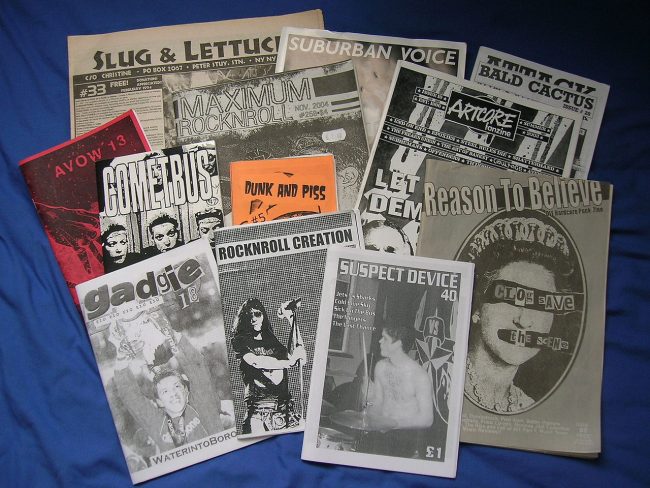Years ago, the only outlet for personal expression was getting your comments published in the local newspaper. If you were living the life of a writer, you could get a guest column in the paper or have a guest article published in a magazine with one exception: your opinion couldn’t be political or too controversial.
In the 1970s, zines became a popular alternative to professionally published magazines because they allowed for controversial and politically oriented opinions. In the 1990s, zines saw a revival in the punk scene, and thousands of zines became available through zine distributors worldwide. Many libraries worldwide have zine archives, and some colleges circulate archived zines.
Zines remained popular through 2011 when they hit a mainstream high. In 2019, zines remain popular, but only to those who know they exist. The younger generations who grew up with Facebook and Instagram don’t know what they’re missing.
Social media changed the face of self-expression
Thanks to social media, everyone has the opportunity to express themselves 24/7 and project those expressions to a hungry audience of their peers. Whenever the urge strikes, people can express their own ideas or share other people’s content, adding their own thoughts to expand the conversation.
To the younger generation, printed forms of self-expression – like zines – are unknown territory, and it’s time for another revival.
The limits of expression on social media sites
People love the idea of self-expression, but social media is hardly the place for expression when your views aren’t mainstream. Each time you post something controversial, you risk getting your account deleted. Contrary to popular belief, freedom of speech doesn’t apply to social media platforms. Freedom of speech isn’t even a right, although many believe it is.
When social media sites ban popular commentators, it seems unfair – and it probably is – but it’s not a First Amendment issue.
Freedom of speech is a grossly misunderstood concept. The First Amendment to the United States Constitution doesn’t give anyone the right to speak freely under any and all circumstances. It simply prohibits the government from establishing laws that abridge a person’s right to free speech. Non-governmental entities like employers and private organizations can create whatever rules they wish.
Social media platforms also have the legal right to censor content and control what users can and can’t say on the platform.
Zines provide an outlet for truly free expression
If you have an opinion mainstream media won’t publish, chances are, there’s a zine that will.
If you can’t get your content published in someone else’s zine, why not start your own? If your opinions and ideas are too controversial for other zine owners, create a niche with your own zine.
Want to start a new zine?
To familiarize yourself with the zine scene, start collecting zines with a similar theme. Browse the zines on Zinenation.org. Each description provides a link to buy a copy or contact the owner. Another way to get familiar with the scene is to attend a zine fest. There aren’t many, but they can be found with a little research.
The process of crafting a zine
While many zine owners make quick copies using their copy machine at home, others opt for professional printing. Although the messy nature of hand-folded zines was a draw in the 1990s, today, a professionally bound zine will stand out more.
This zine creation guide describes the steps involved in producing a high-quality zine, and offers free zine templates to help you get started. Traditionally, zines are saddle stitched. The benefit to saddle stitching is you never have to deal with any staples at home. It’s not worth folding your zines by hand and trying to staple them together.
Zines keep the underground movement of free expression alive
People are tired of magazine ads and fake news articles. They’re tired of getting censored on social media. People want substance, but don’t know where to get it. They want to talk about controversial topics and that’s not happening on social media.
Underground zines like these discuss a wide range of topics including art, culture, women’s issues, race, immigration, and gender. They provide a platform for activists to spread their message and make a difference in the world.
Zines combat censorship
If you’ve got ideas to share with the world, a zine is the best place to express yourself. Unlike magazines, you don’t have to ask for anyone’s permission before creating and publishing a zine. Once you dive into the zine scene, you’ll be glad you abandoned the censorship of social media.
Photo Credit
Photo is Wikimedia Creative Commons
Guest Author Bio
Jamie Lansley
Jamie is a freelance writer who covers trends in business, technology, and health. She loves to go skiing, camping, and rock climbing with her family.
Recent Guest Author Articles:
- How Strong Business Training Translates Into Everyday Decision-Making
- New Career and Degree Paths for Educators Who Want to Make a Broader Impact
- Finding the Right Plumber in Portland: A Comprehensive Guide for Homeowners
- Why Choose Elara Caring for Jackson, MI Home Health Services?
- How I Turned Poetry into a Paycheck



Please Share Your Thoughts - Leave A Comment!